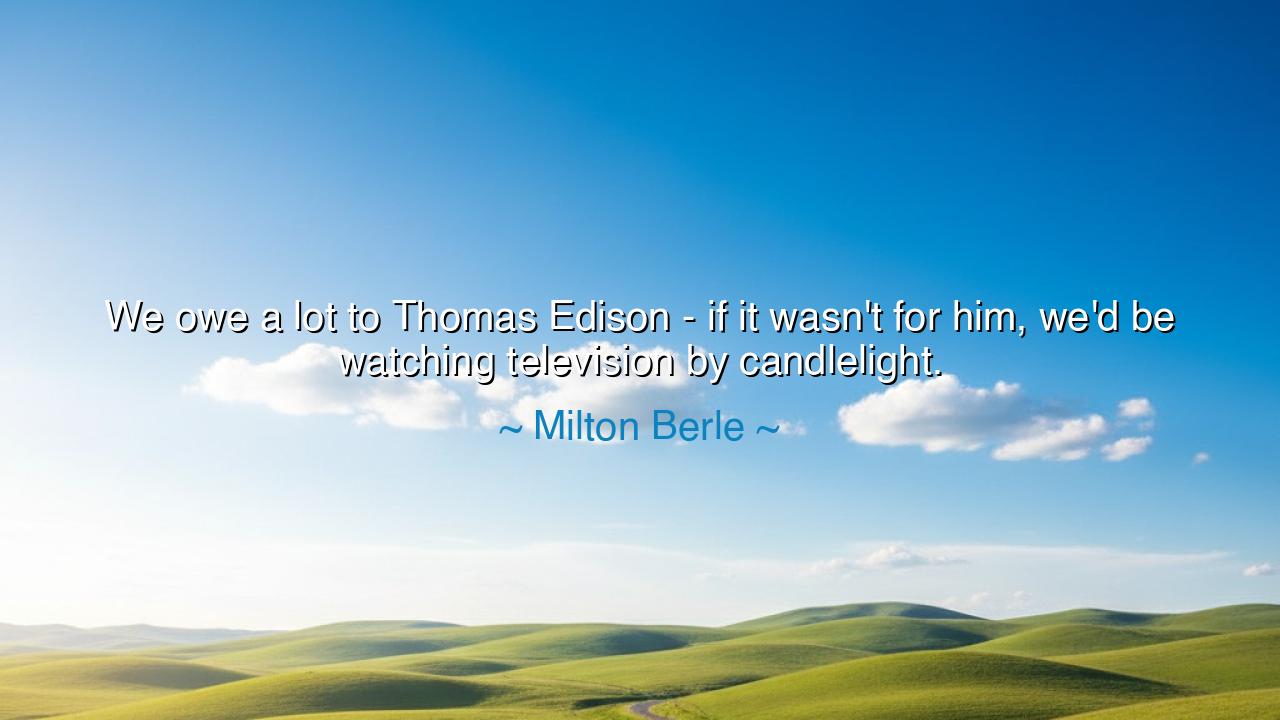
We owe a lot to Thomas Edison - if it wasn't for him, we'd be
We owe a lot to Thomas Edison - if it wasn't for him, we'd be watching television by candlelight.






“We owe a lot to Thomas Edison — if it wasn’t for him, we’d be watching television by candlelight.” — Milton Berle
In this gleaming jest, Milton Berle, the great pioneer of television comedy, wove humor with homage. His words, though playful, conceal an ancient truth: that innovation and gratitude must forever walk hand in hand. On its surface, the quote seems a lighthearted quip — a comedian’s exaggeration about the absurdity of watching television without electricity. But beneath the laughter lies reverence for human progress, for those who, through courage and imagination, bring light into darkness. Thomas Edison, the tireless inventor of the electric light and countless marvels, becomes not just a man of science in this saying, but a symbol of the creative spirit that illuminates civilization itself.
When Berle says, “We owe a lot to Thomas Edison,” he speaks as one torchbearer saluting another. Berle, known as Mr. Television, was among the first to command a new form of light — the light of the screen — just as Edison had tamed the fire of electricity. Without the one, the other could not exist. The joke, that we would “watch television by candlelight,” is a reminder that every generation stands upon the inventions of those before it. It is an echo of the ancient gratitude expressed by the philosophers of old: that wisdom, discovery, and art are not born in isolation, but are the inheritance of all who came before.
The ancients understood this sacred chain of creation. In the great libraries of Alexandria, scholars whispered thanks to the mathematicians and astronomers of earlier ages, just as artists bowed to their muses and philosophers honored their teachers. Each generation lit its candle from another’s flame. So too, Edison’s light was not born from emptiness; it rose from centuries of thinkers — from Archimedes who dreamed of levers, to Benjamin Franklin who danced with lightning. Milton Berle’s jest, then, is not just about Edison, but about the eternal interdependence of genius, the truth that no brilliance stands alone.
And yet, Berle’s humor also carries a deeper wisdom about the nature of progress. For all our inventions, mankind’s spirit remains unchanged — ever striving to push back the darkness, whether that darkness be ignorance, fear, or the simple night. The candle becomes the lightbulb, the lightbulb becomes the screen, and still, humanity reaches for more illumination — not only of the eyes, but of the mind. Edison’s lamp lit the world’s rooms, but it also lit the imagination of future dreamers. The glow of his work burns still, not merely in our homes, but in our creativity, in every invention that followed, in every screen that now reflects the light of his first spark.
Consider the story of Edison himself, who in his youth failed again and again — thousands of experiments that ended in darkness before one finally yielded light. When asked how he could bear such defeat, he replied, “I have not failed. I’ve just found ten thousand ways that won’t work.” In this, he became a parable of perseverance, of the unyielding pursuit of illumination. Berle’s jest, then, hides within it a moral torch: that even humor is born from endurance, that laughter, like invention, is an act of creation against despair. To joke about “watching television by candlelight” is to celebrate the absurdity of life and, at the same time, to honor the courage it takes to brighten it.
The origin of the quote lies in Berle’s era — the dawn of television in the mid-20th century. America was just learning to gather around the glowing box that replaced the hearth. Berle himself, one of the first true television stars, knew the power of light — literal and metaphorical — to unite people, to make them laugh, to make them forget the shadows of war and hardship. His words, though comic, carry reverence for those like Edison who made such unity possible. In a sense, he was acknowledging the spiritual lineage between invention and art — between the spark of the inventor and the spark of the performer.
So, my child, learn from this: honor the light-bringers of every age. Do not mock progress, nor take it for granted, but remember the courage it costs to invent, to imagine, to fail and try again. Laugh, yes, as Berle did, but let your laughter carry gratitude. Every lamp you light, every screen you gaze upon, every comfort you enjoy, bears the fingerprints of the dreamers who came before you. Let their example remind you to build something worthy for those who will come after — that they, too, may have no need to live by candlelight.
And if ever you find yourself in darkness — whether in failure or doubt — remember this truth hidden in the comedian’s joke: light is not given; it is made. As Edison made his through persistence, as Berle made his through laughter, so must you kindle your own. For the true light of humanity is not in our inventions alone, but in the spirit that dares to bring brightness where none yet exists.






AAdministratorAdministrator
Welcome, honored guests. Please leave a comment, we will respond soon